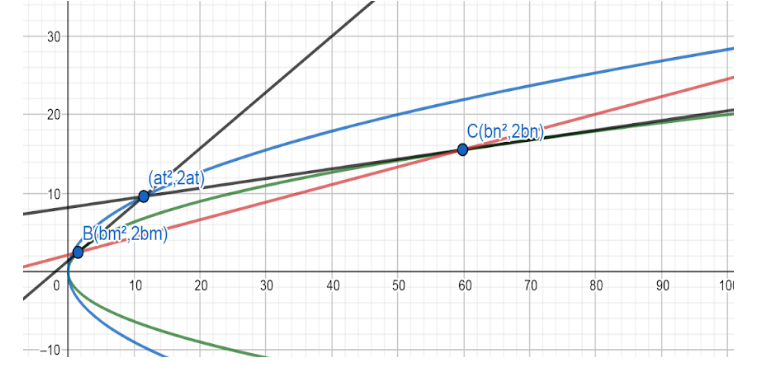Question
Question: Two parabolas have the same axis and tangents are drawn to the second from points on the first; prov...
Two parabolas have the same axis and tangents are drawn to the second from points on the first; prove that the locus of the middle points of the chords of contact with the second parabola all lie on a fixed parabola.
Solution
Hint: Draw tangents from the outer parabola to the inner. Check where the tangents touch the inner parabola and find the midpoint of these points.
Complete step-by-step answer:

Consider the above picture.
There are two parabolas blue(y2=4ax)and green(y2=4bx)
From point A (parameter t) on the blue parabola, two black tangents to the green parabola are drawn. These tangents touch the green parabola at points B (parameter m) and C (parameter n).
We have to find the locus of mid points of the chord BC.
Since AB and AC are tangents to the green parabola, we can write their equations using the parametric form of tangent which is ty=x+at2, where t is the parameter of the point where it touches the parabola.
So we write equations of AB and AC,
AB:my=x+bm2...(i)
AC:ny=x+bn2...(ii)
Since these two lines intersect at A, by solving the above equations together we will get point A.
Subtracting equation (i) from (ii)i.e. (ii)−(i) we get,
(ny)−(my)=(x+bn2)−(x+bm2)
ny−my=bn2−bm2
y(n−m)=b(n2−m2)
y(n−m)=b(n−m)(n+m)
y=b(n+m)...(iii)
Substituting equation (iii) in (i)we get,
n(b(n+m))=x+bn2
bn(n+m)=x+bn2
bn2+bnm=x+bn2
bnm=x
A:(bmn,b(m+n))
AlsoA lies on the green parabola, so it must satisfy its equation i.e. (y2=4ax).
So,
(b(m+n))2=4a(bmn)...(iv)
To find the locus of a point, we consider a point with coordinates(h,k), which is a general point on the locus.
Since (h,k)lies on the locus which is the locus of midpoints of the chord of the parabola.
Using midpoint formula we can write,
Xmid=2x1+x2
ymid= 2y1+y2
Therefore,
h=\left\\{ \dfrac{\left( x~coordinate~of~A \right)+\left( x~coordinate~of~B \right)}{2} \right\\}
k=\left\\{ \dfrac{\left( y~coordinate~of~A \right)+\left( y~coordinate~of~B \right)}{2} \right\\}
h=\left\\{ \dfrac{\left( \text{b}{{\text{m}}^{2}} \right)+\left( b{{n}^{2}} \right)}{2} \right\\}
2h=(bm2)+(bn2)
\dfrac{2h}{b}=\left\\{ {{\text{m}}^{2}}+{{n}^{2}} \right\\}...(v)
k=\left\\{ \dfrac{\left( 2bm \right)+\left( 2bn \right)}{2} \right\\}
k=bm+bn
\dfrac{k}{b}=\left\\{ m+n \right\\}...(vi)
So our next task in finding the locus is eliminating the variables from the above equations.
Squaring equation(vi)and subtracting it from (v) i.e. (vi)2−(v)
Which gives,
{{\left( \dfrac{k}{b} \right)}^{2}}-\dfrac{2h}{b}={{\left( m+n \right)}^{2}}-\left\\{ {{\text{m}}^{2}}+{{n}^{2}} \right\\}
{{\left( \dfrac{k}{b} \right)}^{2}}-\dfrac{2h}{b}=\left( {{m}^{2}}+{{n}^{2}}+2mn \right)-\left\\{ {{\text{m}}^{2}}+{{n}^{2}} \right\\}
(bk)2−b2h=2mn...(vii)
Substituting equations (vi), (vii) in (iv)we get,
(b(bk))2=2ab((bk)2−b2h)
(k)2=2ab((b2k2)−b2h)
(k)2=((2abk2)−8ah)
k2=2abk2−8ah
This is the required locus.
Now since (h,k)are general points on our locus we can replace h by x and k by y.
(b2a−1)y2=8ax
This is the required locus which represents another parabola.
Note: Students have to think carefully while deciding which is the variable before eliminating. In this question students might eliminate a which will give them the wrong answer. Also they may use their different techniques to eliminate the variable from the equations. Also, if they feel it is redundant to use (h,k) first and then replace it as (x,y) they may use (x,y) from the start as well.
